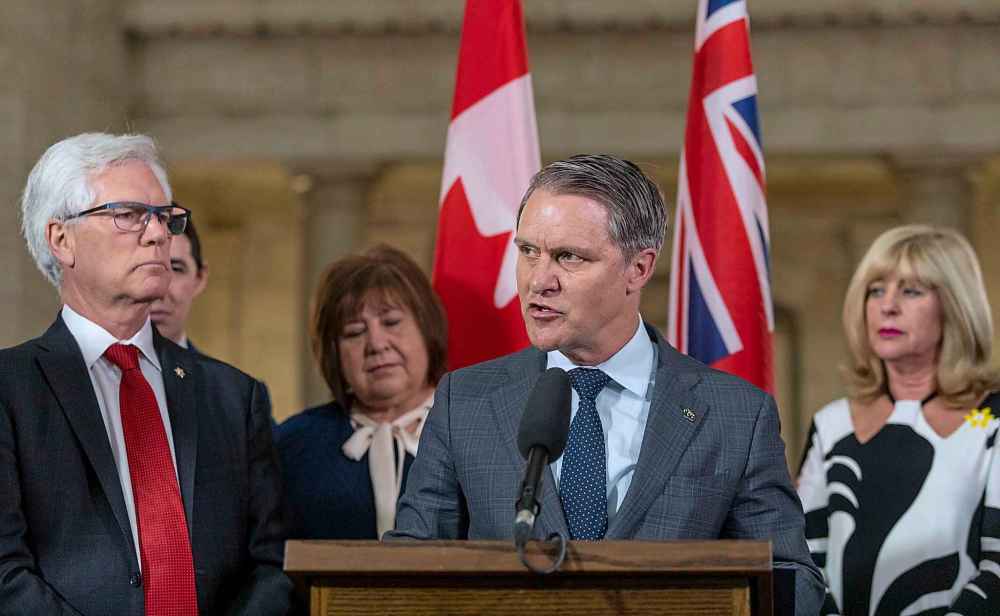Manitoba signs on, secures $182M for home care, mental heath
Read this article for free:
or
Already have an account? Log in here »
To continue reading, please subscribe:
Monthly Digital Subscription
$0 for the first 4 weeks*
- Enjoy unlimited reading on winnipegfreepress.com
- Read the E-Edition, our digital replica newspaper
- Access News Break, our award-winning app
- Play interactive puzzles
*No charge for 4 weeks then price increases to the regular rate of $19.00 plus GST every four weeks. Offer available to new and qualified returning subscribers only. Cancel any time.
Monthly Digital Subscription
$4.75/week*
- Enjoy unlimited reading on winnipegfreepress.com
- Read the E-Edition, our digital replica newspaper
- Access News Break, our award-winning app
- Play interactive puzzles
*Billed as $19 plus GST every four weeks. Cancel any time.
To continue reading, please subscribe:
Add Free Press access to your Brandon Sun subscription for only an additional
$1 for the first 4 weeks*
*Your next subscription payment will increase by $1.00 and you will be charged $16.99 plus GST for four weeks. After four weeks, your payment will increase to $23.99 plus GST every four weeks.
Read unlimited articles for free today:
or
Already have an account? Log in here »
Hey there, time traveller!
This article was published 16/04/2019 (2427 days ago), so information in it may no longer be current.
After more than a year of negotiations, Manitoba and Ottawa formally announced a new health-care accord that will see the federal government invest $182 million over five years for home and community care, and mental health and addictions services.
“This funding will provide families with much-needed additional support in their own communities,” International Trade Diversification Minister Jim Carr said at an announcement Tuesday at the Manitoba Legislative Building that was attended by six Liberal MPs and 11 Progressive Conservative MLAs.
“Today’s announcement shows what we can accomplish when we work together,” he said of the two levels of government.

Manitoba was the last province to sign a bilateral agreement with Ottawa, which pledged $11 billion over 10 years in its 2017 budget to fund services in several targeted areas.
Health Minister Cameron Friesen, acknowledging the long delay in reaching an accord with the federal government, said Manitoba was “very pleased” with the result.
“We can all agree that this day has been a long time coming, but it is here,” he said. “And when it comes to making good deals, that often involves some considerable time.”
He added Manitoba is not losing any funding as a result of signing onto the federal program well after it was first announced.
Program details will be announced in the weeks and months ahead, Friesen said.
In general, the money will be used to expand home care, enhance rural supports for palliative care, increase access to co-ordinated care for mental health and addictions services, offer peer support “in formal health-care settings” for patients with mental health and addictions issues, and fund a program to help families deal with pregnancy and infant loss.
According to the agreement, a total of $72.9 million will be spent in the broad area of mental health and addictions, while $109.3 million will be spent in home care and community care over a five-year period.
The bulk of the mental health and addictions money — $66.7 million — will be spent on increasing the timeliness of mental health and addictions services for Manitobans.
In the area of home care, some of the new funding will allow the province to increase the involvement of nurses in that setting as well as to expand home dialysis services.

Carr said the enhanced home care funding will be used to support Manitobans “who wish to stay in their homes as long as possible.”
The general goals of the federal program have been known publicly for about two years. Friesen said the challenge was tailoring the deal to Manitoba’s needs.
Until Tuesday, there was no mention for funding to help families deal with pregnancy and infant loss. According to the agreement, some $600,000 in federal money will be spent in this area beginning this fiscal year. Friesen said the money will be used to provide counselling and quicker access to services.
He said the loss of a pregnancy or an infant death is a “traumatic event” in a family’s life.
“That loss is profound, it can be debilitating, and it is incumbent on government to do what they can do to meet people at that point of need.”
larry.kusch@freepress.mb.ca

Our newsroom depends on a growing audience of readers to power our journalism. If you are not a paid reader, please consider becoming a subscriber.
Our newsroom depends on its audience of readers to power our journalism. Thank you for your support.









